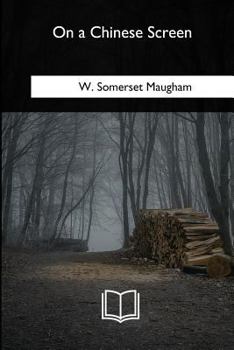On a Chinese Screen
Select Format
Select Condition 
Book Overview
I have always noticed a prevalent want of courage, even among persons of superior intelligence and culture, as to imparting their own psychological experiences when those have been of a strange sort. Almost all men are afraid that what they could relate in such wise would find no parallel or response in a listener's internal life, and might be suspected or laughed at. A truthful traveller, who should have seen some extraordinary creature in the likeness of a sea-serpent, would have no fear of mentioning it; but the same traveller, having had some singular presentiment, impulse, vagary of thought, vision (so-called), dream, or other remarkable mental impression, would hesitate considerably before he would own to it. To this reticence I attribute much of the obscurity in which such subjects are involved. We do not habitually communicate our experiences of these subjective things as we do our experiences of objective creation. The consequence is, that the general stock of experience in this regard appears exceptional, and really is so, in respect of being miserably imperfect. In what I am going to relate, I have no intention of setting up, opposing, or supporting, any theory whatever.
Format:Paperback
Language:English
ISBN:1985384434
ISBN13:9781985384439
Release Date:September 2018
Publisher:Createspace Independent Publishing Platform
Length:148 Pages
Weight:0.46 lbs.
Dimensions:0.3" x 6.0" x 9.0"
Customer Reviews
1 rating
Notes of an Englishman in China
Published by Thriftbooks.com User , 24 years ago
William Somerset Maugham was 45 years old when he went on a trip to China in the winter of 1919. Always an astute observer, he jotted down notes, elaborated them, and finally had them published as a book in London. Fortunately, this small volume is now available again as a Vintage Classics paperback in the UK (and in the reviewer's favorite Shanghai bookstore). "On a Chinese Screen" is an appropriate title for the book because it depicts mostly English people against the backdrop of China at the beginning of the century. In 58 short sketches, the longest of which fits on just nine printed pages, Maugham portrays English missionaries, officials, army officers, adventurers and company managers. Maugham gently mocks their narrow-mindedness and indifference towards the country in which they spend a major part of their lives. "On the whole," he remarks, "it made little difference to them in what capital they found themselves, for they did precisely the same things in Constantinople, Berne, Stockholm, and Peking . . . China bored them all, they did not want to speak of that; they only knew just so much about it as was necessary to their business." Their attitude towards the Chinese was one of "mistrust and dislike tempered by optimism," and they did not bother to learn the language.Whereas Maugham is agreeably malicious in his portraits of the English and their wives, he can get outright scathing and sarcastic when he describes the hypocrisy of protestant missionaries. The Catholics have a better standing with him, which explains why Graham Greene calls Maugham a writer of great dedication. Maugham has a healthy disregard of professedly religious people whose deeds do not live up to their words, no matter whether they are English missionaries who behave as if they were in the civil service or whether they are Chinese farmers who perform the rites "like an old peasant woman in France does her day's housekeeping." Maugham's depiction of the Chinese countryside leaves no lasting impression, yet sometimes he creates images of sheer beauty: "the yellow water in the setting sun was lovely with pale, soft tints, it was as smooth as glass." The focus of his observations are people. Maugham senses the human beings who peek out from behind the roles they play in the scheme of the British Empire. Though he appears to be detached from the hardships of the Chinese, one can feel the effort it takes him to stay aloof when he observes the coolies, the "human beasts of burden", and remarks that their "effort oppresses you. You are filled with a useless compassion." Maugham's most heart-wrenching piece is a story with the innocent title "The Sights of the Town" in which he tells of a so-called baby tower used by the peasants to drop unwanted babies to their deaths. Spanish nuns in the nearby town try to save at least some of the unwanted newborns by paying twenty cents for every one because, as they say, the peasants "have often a long walk to come here and unless we gi






